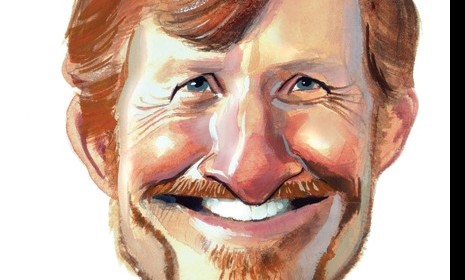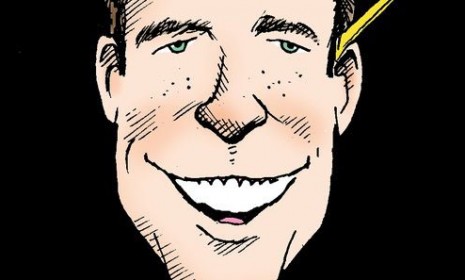Issue of the week: Calling out the crash’s culprits
The Senate's Permanent Subcommittee on Investigations has just published its 635-page report on the financial crisis.
A free daily email with the biggest news stories of the day – and the best features from TheWeek.com
You are now subscribed
Your newsletter sign-up was successful
The U.S. Senate report fills 635 pages, but its conclusion is expressed in just 15 words, said Shah Gilani in Forbes.com: “Our investigation found a financial snake pit rife with greed, conflicts of interest, and wrongdoing.” The report, published last week and titled Wall Street and the Financial Crisis: Anatomy of a Financial Collapse, details “how big banks roped, tied, and branded the U.S. economy and the developed world with their egregious money-making schemes.” No one involved—a veritable “who’s who of Great Recession Actors,” including mortgage banks, investment firms, ratings agencies, and federal regulators—escapes unscathed from the report by the Permanent Subcommittee on Investigations, headed by Michigan Democrat Carl Levin and Oklahoma Republican Tom Coburn. Their joint findings lend their account the credibility missing from a January report by the presidential Financial Crisis Inquiry Commission, which presented competing Republican and Democratic narratives of the meltdown. Levin and Coburn not only agree on the culprits, they also agree that the Justice Department should launch an investigation into “collusion and possibly racketeering.”
Any such investigation would have to focus on Goldman Sachs, said Jim Puzzanghera and Nathaniel Popper in the Los Angeles Times. The investment bank was virtually the only big Wall Street firm that made money during the crisis, and Levin and Coburn devoted much of their two-year investigation to finding out why. What they discovered was that the firm “profited from the financial crisis by betting billions against the subprime market—a position known as being ‘net short.’” That finding directly contradicts Goldman CEO Lloyd Blankfein’s testimony that during the crisis, Goldman “had not consistently tilted its own investments heavily against the housing market.” Why would Blankfein bother to deny the obvious, after the committee found some 3,400 uses of the phrase “net short” in Goldman’s own documents? said Andrew Ross Sorkin in The New York Times. “Goldman should be proud of its prescient call.” Unlike Citigroup and AIG, Goldman not only enriched its shareholders by betting against housing, it spared U.S. taxpayers the expense of a bailout.
Don’t let Goldman hog the spotlight, said Kerri Panchuk in HousingWire.com. The report also “throws egg in the face” of the Office of Thrift Supervision, which was supposed to regulate Washington Mutual, the largest bank to fail in U.S. history. The report documents how the OTS relied on WaMu to “police itself,” even after the regulatory agency identified more than 500 “serious deficiencies” in the thrift’s mortgage operation in a five-year period. If, as the report suggests, high-risk mortgages were “the fuel that ignited the financial crisis,” the OTS is guilty of aiding and abetting an arsonist.
The Week
Escape your echo chamber. Get the facts behind the news, plus analysis from multiple perspectives.

Sign up for The Week's Free Newsletters
From our morning news briefing to a weekly Good News Newsletter, get the best of The Week delivered directly to your inbox.
From our morning news briefing to a weekly Good News Newsletter, get the best of The Week delivered directly to your inbox.
A free daily email with the biggest news stories of the day – and the best features from TheWeek.com
-
 How the FCC’s ‘equal time’ rule works
How the FCC’s ‘equal time’ rule worksIn the Spotlight The law is at the heart of the Colbert-CBS conflict
-
 What is the endgame in the DHS shutdown?
What is the endgame in the DHS shutdown?Today’s Big Question Democrats want to rein in ICE’s immigration crackdown
-
 ‘Poor time management isn’t just an inconvenience’
‘Poor time management isn’t just an inconvenience’Instant Opinion Opinion, comment and editorials of the day
-
Issue of the week: Who killed the Twinkie?
feature The seemingly imperishable Twinkie has finally met its match, and its name is Big Labor.
-
Issue of the week: Apple’s patent victory over Samsung
feature Apple's “sweeping victory” is among the biggest intellectual-property triumphs on record.
-
Issue of the week: Goldman Sachs’s ‘toxic’ culture
feature Greg Smith’s stinging public resignation from Goldman Sachs landed on Wall Street “like a bomb.”
-
Issue of the week: Can a mortgage deal revive housing?
feature Five big banks reached a settlement with state and federal officials to pay $26 billion to offset some of the damage caused by their misdeeds in the foreclosure crisis.
-
Issue of the week: Europe gets downgraded
feature Standard & Poor's lowered the credit rating for nine European nations, indicating that Europe has not yet convincingly dealt with the debt crisis.
-
 Tom Toles: Cartoonist of the Year
Tom Toles: Cartoonist of the Yearfeature Meet the winner of The Week's Cartoonist of the Year award
-
 Cartoonist of the Year finalists
Cartoonist of the Year finalistsfeature A brief look at this year's nominees
-
Issue of the week: Wal-Mart vs. its female employees
feature The case against Wal-Mart, which began with six female workers, has grown into a class action on behalf of as many as 1.5 million female employees.